Urgent warning in effect until Saturday as temperatures drop to -8 degrees Celsius: risk of hypothermia, strokes and fatal infections
A six-day ‘orange’ health alert for colds has been issued for most of England today, amid concerns for the elderly and vulnerable.
Temperatures are set to drop as low as -8 degrees Celsius in the North East this week as a blast of Arctic air moving into Britain brings heavy frost, ice and snow showers.
Up to 20cm of snow could accumulate in the worst-hit areas as the country experiences its ‘first taste of winter’.
The UK Health Security Agency (UKHSA) said the warning – first issued this year – would be in force until Saturday, November 23.
Officials warned that the low temperatures were likely to put pressure on the NHS and could increase risks for patients, including the elderly, and those with pre-existing health problems such as respiratory and cardiovascular disease.
Cold weather also puts people at greater risk of hypothermia, stroke and even heart attacks, experts say.
Dr. Agostinho Sousa, Head of Extreme Events and Health Protection at UKHSA, said: ‘This is the first orange Cold Weather Health Alert of the season, but we can expect more as winter approaches.
‘It is critical to check in on vulnerable friends, family and neighbors to ensure they are well prepared for the onset of cold weather.
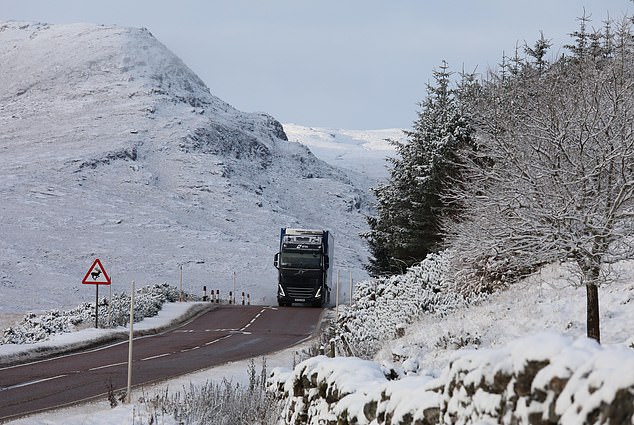
Pictured this morning, a truck on a snow-covered A835 near Loch Dorma in the Scottish Highlands
‘Especially if they are older or otherwise at increased risk.’
The orange alert currently applies to the East Midlands, West Midlands, East of England, North East, North West and Yorkshire and Humber.
A new alert will be in force for the South East, South West and London at 8am tomorrow.
The UKHSA reminded Britons of its cold weather plan, which recommends regular contact with vulnerable people.
It also urged people to keep an eye on weather forecasts and ensure they are well stocked with food and medicine.
Icy air can be risky for people with respiratory conditions, such as asthma and chronic obstructive pulmonary disease.
This is because when cold air is inhaled, the airways narrow and the lungs contract.
This can cause breathing difficulties, wheezing and coughing, as well as asthma attacks.
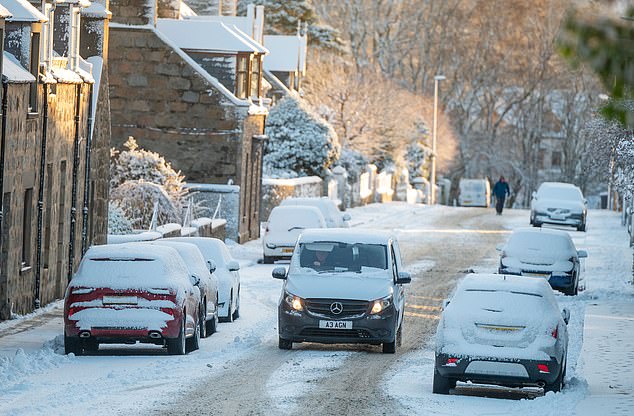
Cars are pictured driving through the snow on the A97 near Huntly, Aberdeenshire this morning
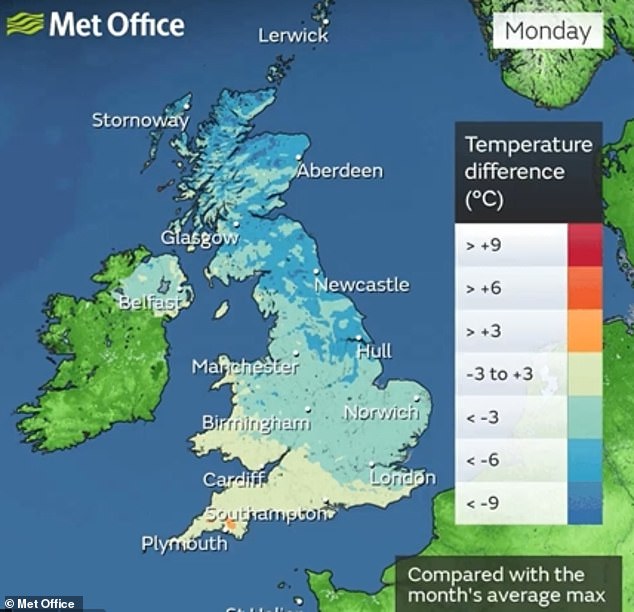
Health chiefs are advising people at risk to wrap a scarf around their nose and mouth to limit respiratory irritation and asthma attacks.
In addition to the cold conditions outdoors, cold and damp weather can increase the risk of mold and moisture developing in homes and buildings, which can also irritate the lungs.
Worryingly, studies also show that heart attacks and strokes are up to twice as likely during cold spells lasting four days or more.
This is because the blood vessels in the skin, fingers and toes narrow in response to the cold as the body tries to retain heat.
This process, called vasoconstriction, increases blood pressure and heart rate because the heart has to work harder to pump blood around the body.
Seasonal viruses, such as influenza and RSV, usually also occur in winter.
This is partly because people are spending more time socializing indoors and in poorly ventilated spaces.
This increases the chance that an infected person will pass the virus on to others.
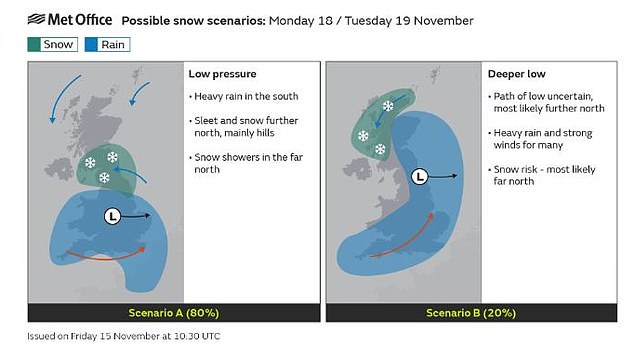
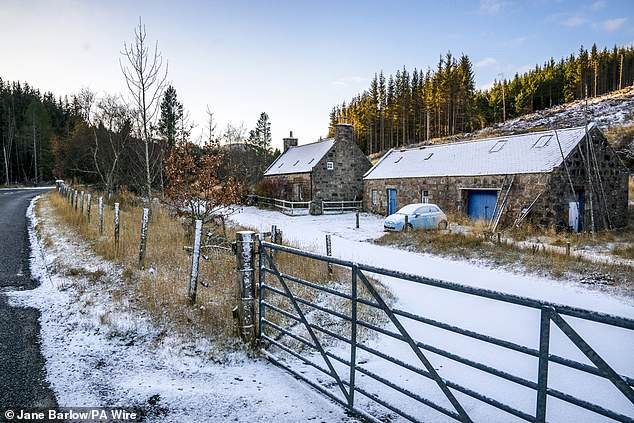
Pictured today is snow and ice in Corgaff, Aberdeenshire, as Britain braces for more snow
But also behind the annual surge of bugs is the cold weather, which suppresses the immune system, increasing the risk of infection and making it harder for the body to fight off a disease, experts say.
This can cause coughing and usually mild lung conditions to become more severe than during the warmer months.
Cold weather is also a major risk factor for hypothermia, which occurs when your body loses heat faster than it can produce it and your body temperature drops below 35 degrees Celsius.
Too low a body temperature affects the brain, meaning the affected person may not be able to think clearly or move properly.
This makes hypothermia particularly dangerous, because a person may not know it is happening and cannot do anything about it.
The NHS is urging anyone who thinks they are suffering from signs of hypothermia to go to A&E or call 999.
But don’t use “a hot bath, hot water bottle or heat lamp to warm someone with suspected hypothermia,” as this could “make matters worse,” the health department warns.
Met Office spokesperson Nicola Maxey said the snow has so far mainly fallen on hilltops – with 2cm of snow in Lerwick, Shetland.
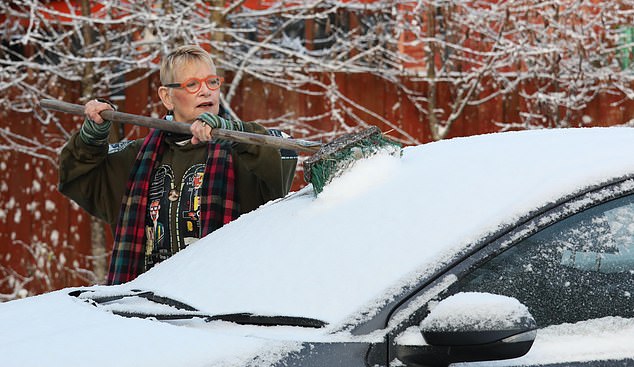
Shannon Finlayson uses a broom to remove snow from the windscreen of her car in Inchbae, Wester Ross in Scotland
But more snow and ice is expected in the coming days, with temperatures dropping below average for this time of year.
“It’s going to be a pretty cold week,” Ms Maxey said. ‘A few degrees below average for most of the country both day and night.’
Temperatures are forecast to drop to minus 2 degrees Celsius in London on Friday, minus 4 degrees Celsius in Birmingham and minus 7 degrees Celsius further north.
Forecasters predict 5-10 cm of snow above 200 meters and 15-20 cm above 300 meters. Lower levels saw between 2 and 10 cm of snow.
According to the Met Office, last night was the coldest of the season so far, with the mercury hitting -7.8 degrees Celsius in Tulloch Bridge in the West Highland – the lowest temperature in Britain since last winter.
In advice released today by Age UK, director Caroline Abraham urged ‘everyone to be careful so they don’t fall victim to the cold’.
She added: ‘Freezing temperatures could also cause the NHS, which is already under immense pressure, to buckle under the pressure of even higher demand.
‘It is very important that the elderly stay fit, warm and healthy if possible.
‘We all play a part in this by looking out for the older people around us, especially if they are living with serious health conditions or lack local support.
‘Having plenty of warm food and drink during the day can help keep the health risks of the cold at bay, as can taking simple precautions such as dressing warmly when going outside and sleeping with the windows closed at night. ‘
She said: ‘Now is the time for all of us to keep a friendly eye on elderly relatives, friends and neighbours. It can be a real help to offer to deliver groceries or pick up medication from the pharmacy.
‘If you are concerned about an older friend or relative, or if you are an older person worried about paying food or energy bills, please contact Age UK as help may be available.’
